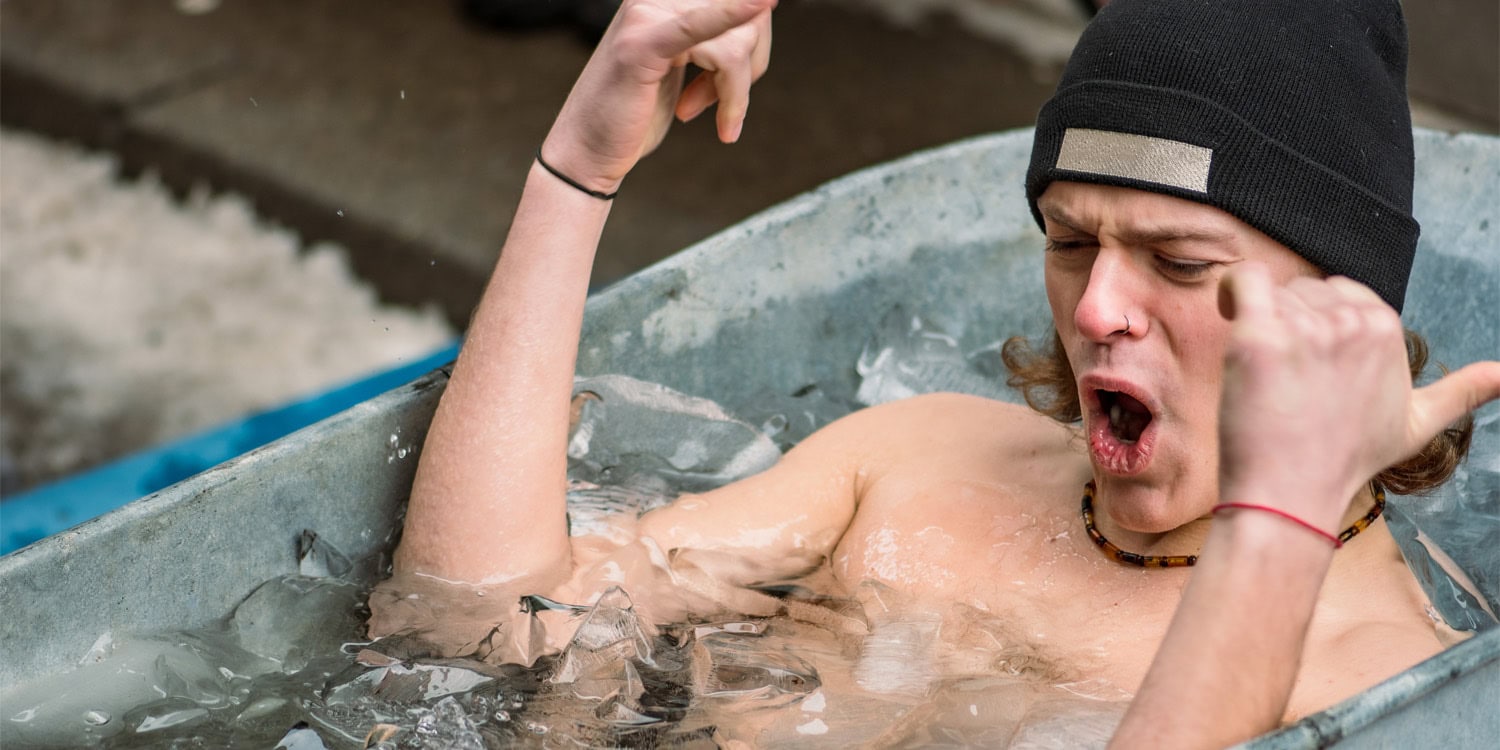Cold-water immersion has gained popularity as a recovery tool, often credited with promoting physical recovery and mental well-being. A recent study published in Physiology & Behavior investigated the effects of regular cold-water immersion on cognitive performance, sleep quality, and well-being. The researchers found that immersing participants in 10°C water for 10 minutes, three times a week over four weeks, improved certain aspects of cognitive function and sleep quality.
Cold-water immersion has long been used in athletic and therapeutic contexts, primarily for physical recovery. However, its effects on cognitive performance, sleep, and overall well-being are less understood. Previous research has shown that extended exposure to cold temperatures can impair cognitive functions, such as attention, memory, and executive functioning. These studies often involved extreme conditions—very cold water and long immersion durations—that do not reflect typical cold-water immersion practices. Recognizing this gap, the researchers aimed to examine the effects of a more realistic cold-water immersion protocol commonly used by individuals for recovery and well-being.
“Much of the previous research in our lab has focused on the importance of cold-water immersion for post-exercise recovery,” said study author Robert Allan, a senior lecturer in human physiology at the University of Central Lancashire. “However, what is becoming more evident is the use of this technique for other reasons. What we are seeing is a growing trend in cold-water immersion within the general population, in the belief that it may help with a number of positive physiological and psychological changes linked to improvements in overall general health and well-being.
“Additionally, previous work has suggested a negative impact of cold-water immersions on cognitive performance. However, this tended to be prolonged exposure to cold water (~1 hour), rather than temperatures and durations that are more likely used for health and well-being benefits (~10-15 minutes). Therefore, we wanted to assess the impact of a more ecologically valid immersion protocol—one that is closer to what is regularly used by the general population on an almost daily basis—on cognitive performance and markers of general health and well-being.”
“Sometimes science doesn’t always necessarily lead the way but can be used to confirm things that are already being done. In this case, this is what we were looking to do. Could we confirm the benefits that so many people were seeking when they go for a dip in their local lake, sea, or home-based immersion ‘pod’? Importantly, we wanted to assess the response acutely, after a single immersion, and chronically over several weeks.”
The researchers recruited 13 healthy participants, comprising eight men and five women, with an average age of approximately 21 years. Before beginning the experiment, participants were screened to ensure they had no known cold-related conditions, such as Raynaud’s syndrome, and completed a physical activity readiness questionnaire.
The cold-water immersion protocol involved submerging participants to their waist or chest in water maintained at 10°C for 10 minutes. These immersions were conducted three times per week for four consecutive weeks. Measurements were taken at six time points: before the first immersion (baseline), immediately after the first immersion, and at the end of each week. These measurements included assessments of cognitive performance, subjective well-being, sleep quality, and worry. Cognitive performance was evaluated using the Stroop test, which measures executive function and selective attention, and the Trail Making Test, which assesses processing speed and mental flexibility.
Well-being and sleep quality were measured using standardized questionnaires, including the Warwick-Edinburgh Mental Well-Being Scale and the Pittsburgh Sleep Quality Index. Additionally, subjective worry was assessed using the Penn State Worry Questionnaire. Participants were instructed to refrain from caffeine and alcohol for 24 hours before each session to avoid confounding effects.
The researchers found nuanced effects of cold-water immersion on cognitive performance, sleep quality, and worry. Cognitive improvements were observed in the Trail Making Test. Both TMT-A (processing speed) and TMT-B (mental flexibility) completion times improved significantly over the four weeks. For instance, TMT-A times decreased from an average of 15.17 seconds at baseline to 11.06 seconds by the third week, while TMT-B times dropped from 39.68 seconds to 26.18 seconds during the same period. These results suggest that regular cold-water immersions may enhance certain aspects of cognitive functioning over time.
The findings indicate that “these short, frequent immersions might improve certain aspects of cognitive function,” Allan told PsyPost.
The Stroop test results, in contrast, showed no significant changes. Completion times and error rates for both Stroop-ON and Stroop-OFF tasks remained stable throughout the study, indicating that cold-water immersion neither impaired nor improved selective attention or executive function.
In terms of sleep quality, participants reported a reduction in sleep disturbances. Pittsburgh Sleep Quality Index scores, which reflect sleep quality, decreased from an average of 7.85 at baseline to 5.75 by the end of the third week. These findings indicate that cold-water immersion contributed to better sleep over the course of the study.
“Two weeks of regular therapeutic cold-water immersion improved subjective sleep, with fewer sleep disturbances reported,” Allan said. “Cold-water immersion to assist with sleep may be more efficient at times when sleep disturbances are more pronounced.”
Participants also experienced a reduction in subjective worry. Scores on the Penn State Worry Questionnaire showed significant decreases after the first immersion, with this improvement maintained throughout the study. However, broader measures of well-being, such as the Warwick-Edinburgh Mental Well-Being Scale and the Subjective Happiness Scale, did not show significant changes. This suggests that while participants felt less worried and slept better, their overall sense of well-being and happiness remained unchanged.
“One surprising result was the lack of alignment with previous findings regarding mood improvement,” Allan told PsyPost. “While we observed a reduction in worry scores, our data indicated a neutral change in reported mood scores. An important caveat to this is that there was no negative change in mood scores seen in our data, and sometimes a neutral change (or lack of negative change) can be somewhat positive.
“However, previous research has suggested a strong positive influence of cold-water immersion on mood improvement. Importantly, our cold-water immersion protocol took place in a controlled laboratory environment independently, and not in ‘open water’ settings such as seas or lakes with other like-minded people. It could be suggested that the difference noted for mood improvement between our data and previously published data might be the lack of ‘green and blue space’ or socialization experienced by our participants. This is something that requires further investigation.”
“In addition to this, the importance of sleep to health, well-being, and post-exercise recovery is a well-established area that is still growing,” Allan continued. “It was nice to see our data of improved subjective sleep quality support more quantitative data published in recent years. If anything, our data has provided us with more questions to investigate, such as the importance of the water’s temperature on sleep and the quality of sleep prior to undertaking immersion protocols.”
While the findings are promising, the study includes a few caveats.
“It isn’t easy to design the perfect experiment, so limitations will always exist,” Allan noted. “Our data was conducted in a small sample of healthy individuals. What isn’t clear is the impact this immersion protocol will have on non-healthy individuals and those with contraindications, such as cardiovascular disease and cold hypersensitivity. Any concerns should be discussed with a medical professional first.”
“More importantly, our data was conducted in a laboratory-controlled environment with a number of safety precautions undertaken. When immersing in cold water, the body undergoes a series of physiological responses known as ‘the cold-shock response’ that can pose a risk to safety and increase the likelihood of drowning when immersion is conducted in open waters or when immersing alone. Therefore, it is important that any discussion of cold-water immersion is provided with an important dose of precaution.”
The study also relied on self-reported measures for sleep and well-being, which, while useful, may be influenced by subjective biases. Future research could include objective measures, such as polysomnography to assess sleep and electrodermal activity to measure stress, to provide a more comprehensive understanding of the effects of cold-water immersion.
“There is certainly hope that some of this data can be expanded upon in future years,” Allan said. “While this investigation relied heavily on subjective questionnaires, it is hoped we can build future collaborative projects that incorporate more quantitative physiological measurements and deeper qualitative analysis.”
The study, “Influence of acute and chronic therapeutic cooling on cognitive performance and well-being,” was authored by Joseph Knill-Jones, Gareth Shadwell, Howard T. Hurst, Chris Mawhinney, Jonathan K. Sinclair, and Robert Allan.




